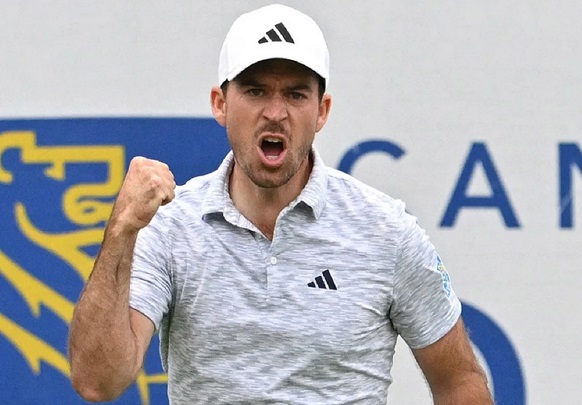TORONTO — Nick Taylor became the first Canadian in 69 years to win his national open, holing a 72-foot eagle putt on the fourth playoff hole to beat Tommy Fleetwood in the RBC Canadian golf Open.
Taylor tossed his putter into the air and jumped into the arms of his caddie after making the longest putt of his PGA Tour career, and fellow Canadian players Mike Weir, Corey Conners and Adam Hadwin were among those who ran out to the green to congratulate him.
Hadwin was tackled by a security guard while spraying champagne from a bottle.
The last player from Canada to win the Canadian Open was Pat Fletcher in 1954 at Point Grey in Vancouver, AP reported.
Fletcher was born in England; Carl Keffer had been the only Canadian-born champion, winning in 1909 and 1914.
Elsewhere, Rory McIlroy played 81 holes of practice ahead of the Masters and is a member of the club which hosted the US PGA Championship.
But after missing the cut at Augusta National and finding local knowledge could not make up for a misfiring long game at Oak Hill, McIlroy will go back to basics for the 123rd US Open.
Los Angeles Country Club will stage the year’s third major championship and McIlroy is part of the vast majority of the field to never play the course before, although the likes of Scottie Scheffler and Collin Morikawa were part of the winning Walker Cup team there in 2017.
“I have not played there yet,” McIlroy confirmed during his title defence at the RBC Canadian Open. “I’ll first lay eyes on it on when I get to LA.
“I’ve watched some videos on YouTube. I sort of know the look of the course and the topography a little bit and sort of what to expect. But you don’t get a real grasp of it until you’re actually out there and your feet are on the ground.”
McIlroy’s extensive practice ahead of the Masters came despite the year’s first major being the only one played on the same course, a course on which he has competed every year since 2009.
“Don’t worry, I was telling myself that for the two weeks afterwards,” the four-time major winner said with a wry smile.
“I’m like, ‘Why do I spend so much time here?’. I know it like the back of my hand. It’s the one course we play from memory, rather than what’s just right in front of us.
“And from my experience I play better when I just react to what’s in front of me, instead of playing by memory. Sometimes it’s nice playing courses a little blind.






Discussion about this post